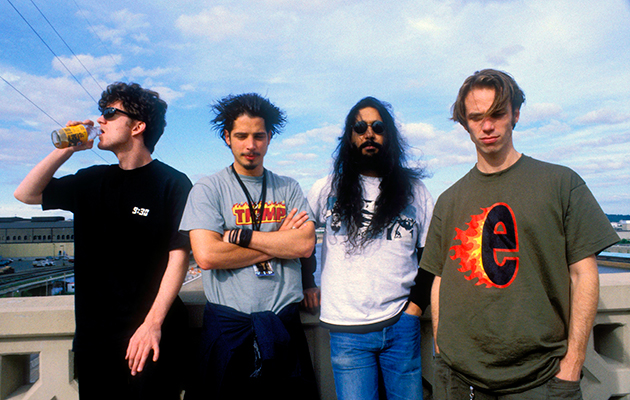A sombre, psychedelic ballad that became an international summer smash for the Seattle grunge rockers in 1994. "That’s what people connected with, the sound that is the result of a band effort," says Chris Cornell. Words: Peter Watts. Originally published in Uncut's August 2014 issue (Take 207). ...
A sombre, psychedelic ballad that became an international summer smash for the Seattle grunge rockers in 1994. “That’s what people connected with, the sound that is the result of a band effort,” says Chris Cornell. Words: Peter Watts.
Originally published in Uncut’s August 2014 issue (Take 207).
__________________________________
A couple of weeks after Kurt Cobain’s suicide, a strange, sombre piece of American heavy rock hit the charts. With its moody refrain, hypnotic melody and gorgeous arpeggios, Soundgarden’s “Black Hole Sun” seemed to chime with the spirit of the times. It was also the song that brought Soundgarden a level of success that was long overdue. Soundgarden were the first band from the late-’80s Seattle scene to sign to a major label, although having dutifully polished their craft opening for the likes of Guns N’ Roses, the colossal success enjoyed by Pacific Northwest peers like Nirvana and Pearl Jam had so far eluded them: “the sound of the underground going overground,” as bassist Ben Shepherd puts it.
But “Black Hole Sun” was a grimy psychedelic behemoth, inescapable on radio and especially on MTV, thanks to what songwriter Chris Cornell calls a “comically interesting video”. Nevertheless, the band had initially been wary of the song’s huge commercial potential – for a while afterwards some of them would refuse to play it live – but Cornell notes that the song’s innate strangeness meant that “‘Black Hole Sun’ didn’t seem to corner us or create a problem, it provided a moment when a lot of eyes and ears were on us. We didn’t have to recreate ‘Black Hole Sun’, we never felt that need.”
“Black Hole Sun” – and its stunningly successful parent album Superunknown – ushered in multi-platinum success and a Grammy for the band. Soundgarden split in 1997, reforming in 2010. During that time, “Black Hole Sun” enjoyed a life of its own, covered and reinvented by everybody from Paul Anka to Anastacia. “You can spend an hour looking at different versions on YouTube and they are all very different,” says Cornell. “The last one was a group called Strings Attached which starts normally and then completely freaks out with flute and violin. People send me links all the time and they seem to get weirder and weirder.”
__________________________________
CHRIS CORNELL: I wrote it in my head driving home from Bear Creek Studio in Woodinville, a 35-40 minute drive from Seattle. It sparked from something a news anchor said on TV and I heard wrong. I heard ‘blah blah blah black hole sun blah blah blah’. I thought that would make an amazing song title, but what would it sound like? It all came together, pretty much the whole arrangement including the guitar solo that’s played beneath the riff.
KIM THAYIL: There are so many ways to write a song but in this one the melody is so strong that I’m inclined to believe he was humming the melody and then constructed the notes and chords around it.
CORNELL: I spent a lot of time spinning those melodies in my head so I wouldn’t forget them. I got home and whistled it into a dictaphone. The next day I brought it into the real world, assigning a key and adding a couple of key changes in the verse to make the melodies more interesting. Then I wrote the lyrics and that was similar, a stream of consciousness based on the feeling I got from the chorus and the title.
BEN SHEPHERD: I knew immediately it was a heavy-hitting song. I equated it with Stevie Wonder, that level of songwriting. Huge.
THAYIL: It wasn’t the heavy, guitar-orientated song we were used to. It had more of a pop construction, but it had seemed powerful.



